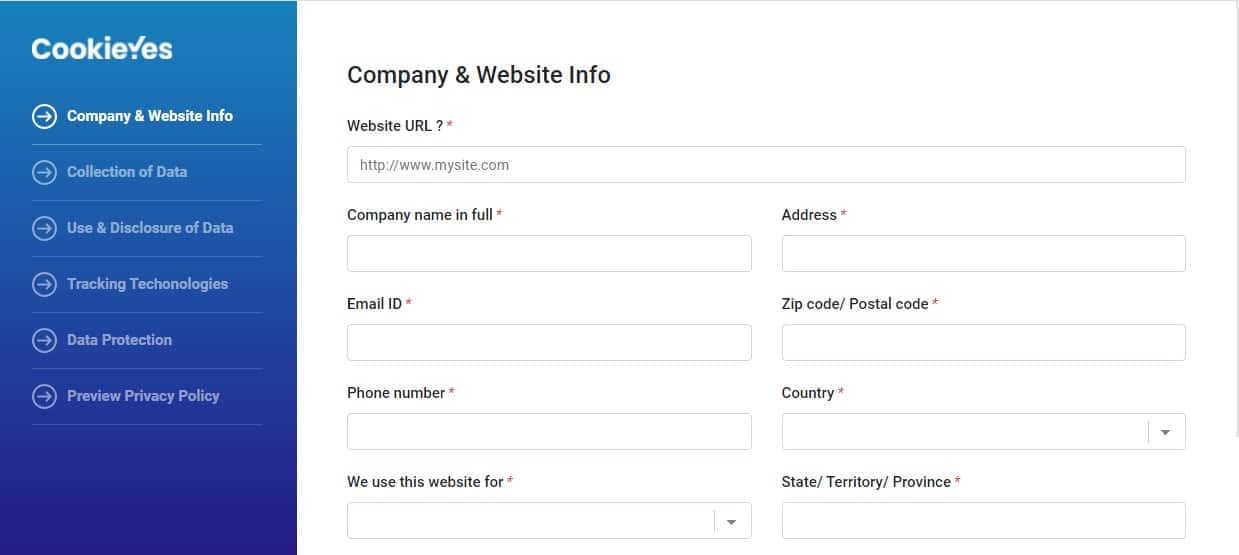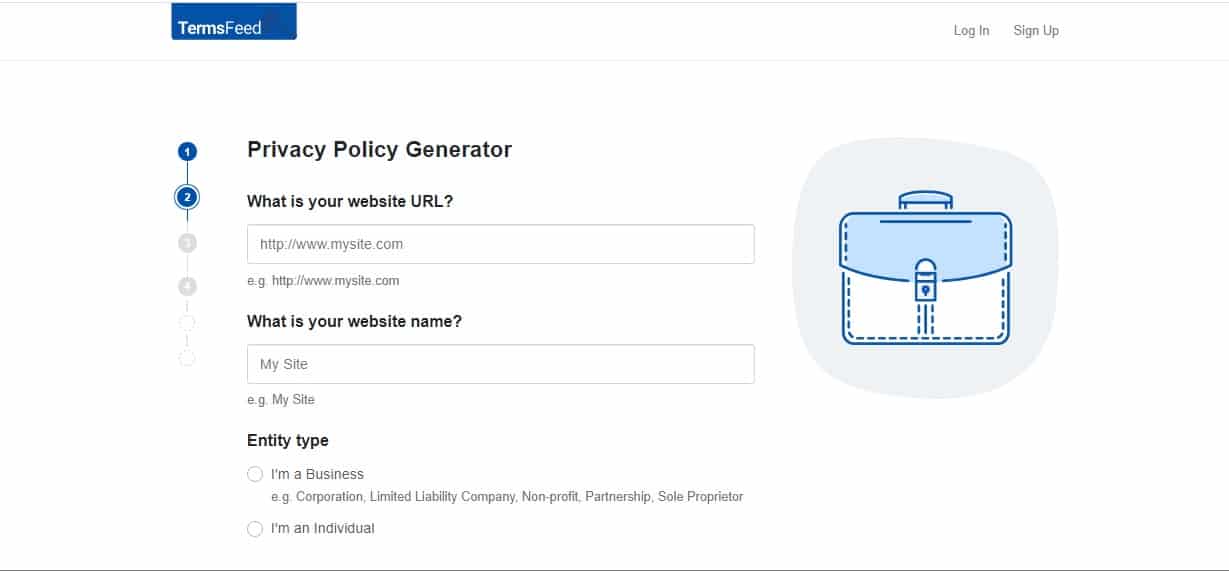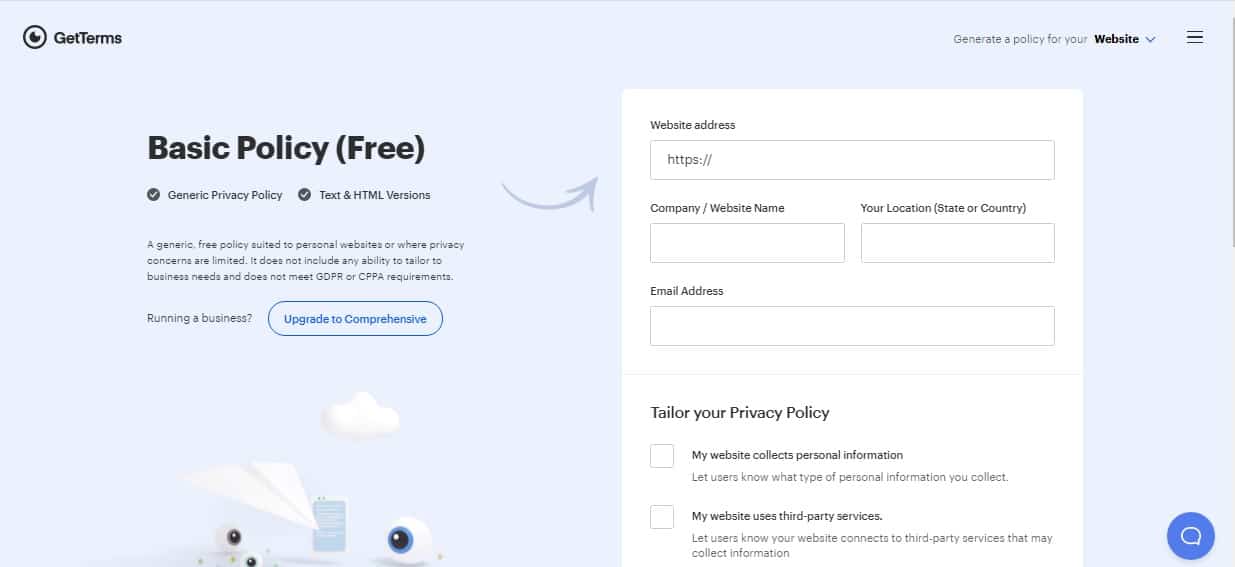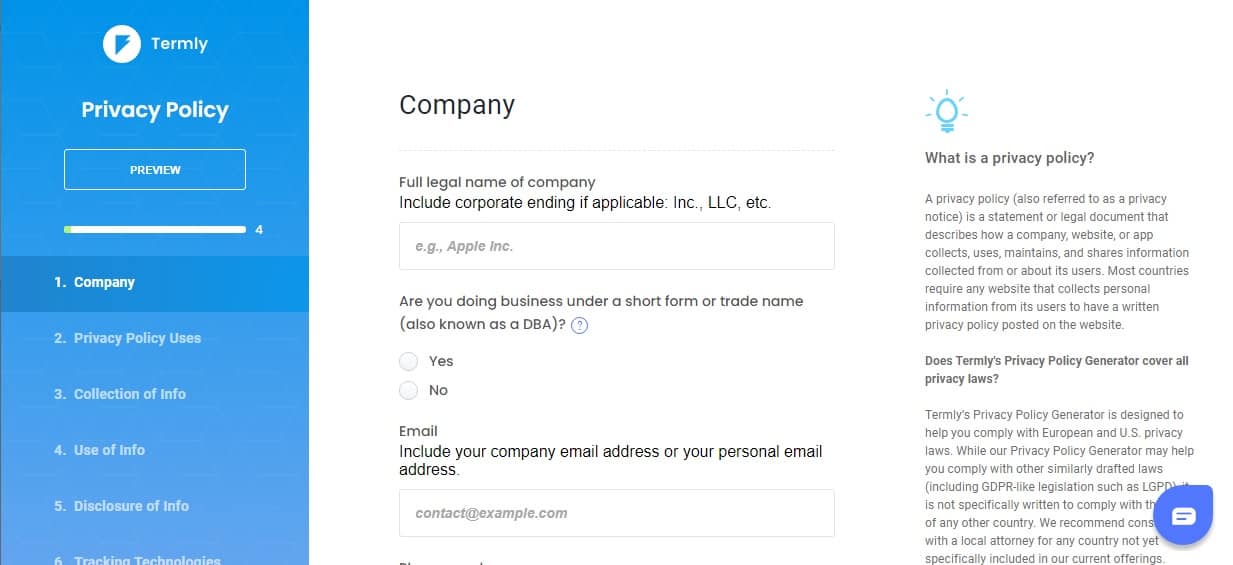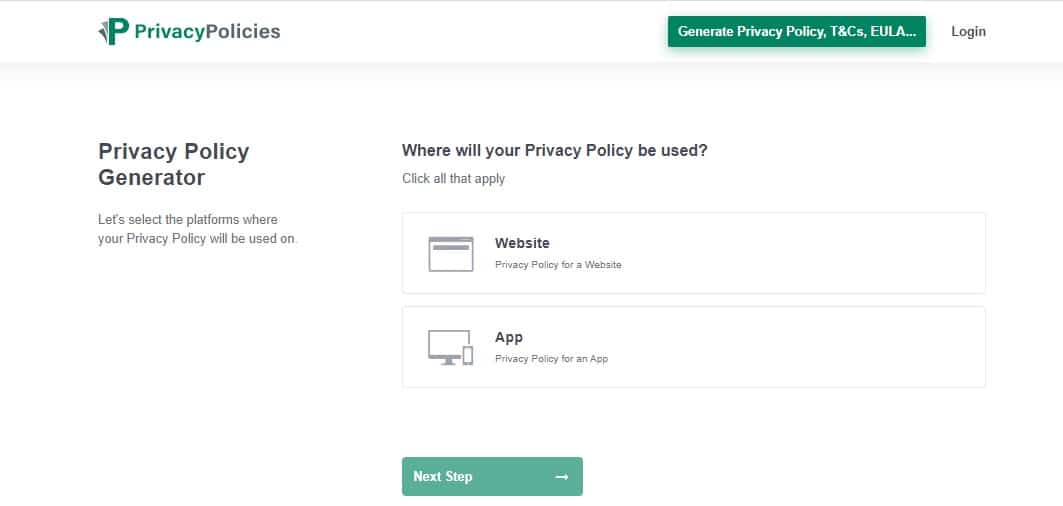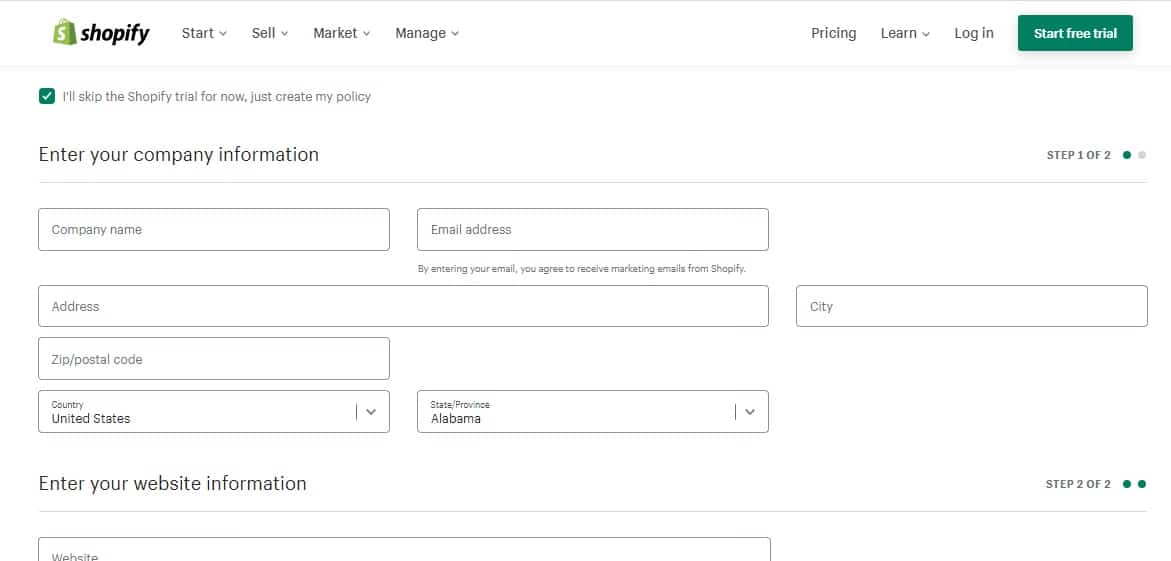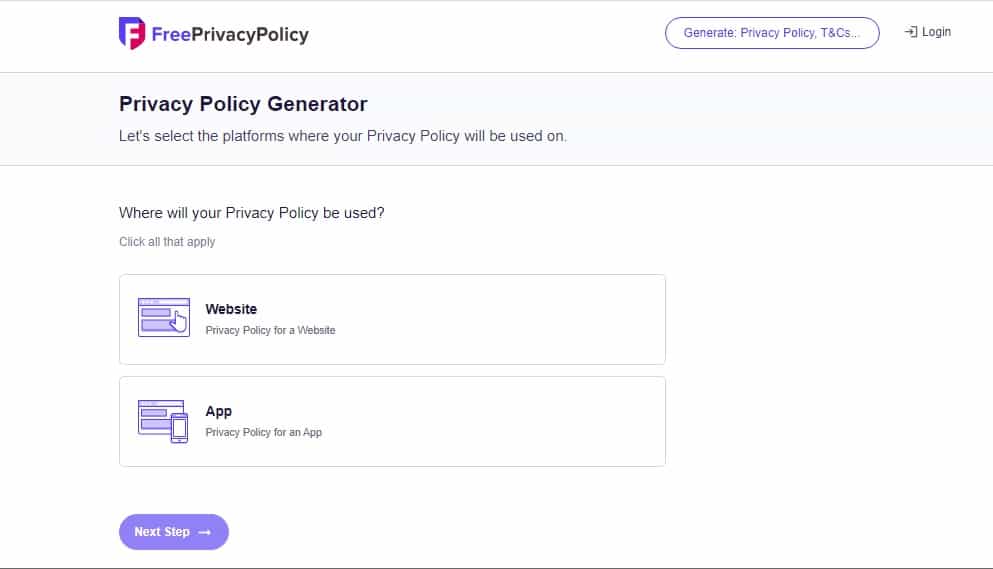If you have a website, there are several legal notifications that you need to put on it. These include a cookie consent form and also a Privacy Policy page. Strictly speaking, you only need to state your website’s privacy policy if the site collects data from visitors. Keep in mind that just collecting email addresses from visitors to put into your contact management system for an email campaign makes you eligible for a Privacy Policy page requirement.
If your site is just a blog and doesn’t collect any information from visitors then legally, you don’t need a Privacy Policy page. However, the legal landscape for the World Wide Web is changing all of the time and you can be sure that legislation is not going to loosen. So, it is a good idea to put a Privacy Policy statement on your site while you are developing it to make sure you are covered in case the law suddenly changes.
Here is our list of the best privacy policy generators:
- CookieYes Free Privacy Policy Generator EDITOR’S CHOICE An excellent no-pressure free generator for GDPR-compliant privacy policy statements. This online service is produced by a well-regarded cookie consent manager provider.
- TermsFeed An easy-to-use questionnaire-led privacy policy generator that produces tailored statements for GDPR and CCPA compliance. Some options are free.
- Get Terms A privacy policy creator that is available in free and paid versions and is provided online.
- Termly Free Privacy Policy Generator A privacy policy creation system that is intended for small sites with a low visitor count. There is a paid version for larger sites.
- PrivacyPolicies A privacy policy generator that is offered in free and paid versions. Includes notifications for trackers and ads.
- Shopify Free Privacy Policy Generator A free service offered by an eCommerce hosting service.
- Free Privacy Policy A system that offers free and paid privacy policy statements that are hosted by the service and you can also choose to download them and insert them on your sites.
You can read more about each of these options in the following sections.
The Privacy Policy page tells visitors what your company will do with the information they give you. The policy should state the following:
- The creation date of the current version of the privacy policy
- What information the site collects about visitors
- How that information is collected
- The reason for requiring personal information
- How collected personal information is stored and protected
- What your company will do with the collected information
- How visitors will be informed when the privacy policy changes
- Who has access to collected information
The legal requirement for the format of the text in the Privacy Policy page varies from country to country, with the major laws surrounding this requirement being laid down in the EU, in California, and Brazil. Fortunately, the data privacy protection laws in these states are all very similar, so there are services available that can generate Privacy Policy statements to please all requirements.
Rather than studying all of the current laws surrounding this requirement, it is just a lot easier to get the Privacy Policy from someone else. A very simple solution to this task is to just look at a website that is very similar to yours, copy their text, edit it to insert information about your business and website where necessary.
The Privacy Policy statement on your site is going to be pretty standard. Most of the text is the same for all websites so there isn’t much complexity to getting the right format. As explained above, you could just copy the text from another website. For this reason, you shouldn’t have to pay much for the services of a privacy policy generator – they aren’t very complicated. Cookie policies are a different matter.
A very large proportion of the websites in the world have been generated. If your site is based on WordPress or you created it with Joomla, Drupal, Wix, or any other website generator, your site is going to use cookies. Just because you don’t remember ever being asked about inserting cookie functionality in your site doesn’t mean that the site generator didn’t put them in.
The presence of cookies in your site’s operating processes is a big problem. Because of them, even if your site doesn’t collect any information from users, you will need to get consent for the cookies.
Cookie consent isn’t just a matter of telling people about the cookies your site uses. First of all, you need to find out what cookies are used on your site. The next problem is that visitors have the right to reject some or all of the cookies that your site wants to download onto their computers. This requires an extra cookie blocking mechanism to be built into the code of your site.
Fortunately, many companies offer cookie consent management services. These scan your site for cookies, generate a consent banner, and then optionally block cookies from downloading depending on the response of the site visitor. Cookie consent management is not as straightforward as privacy policy generation and so cookie consent managers are paid products. You can read more about Cookie Consent Tools here at Comparitech.
Privacy Policy statements and cookie consent management are closely linked and so companies that offer cookie consent managers will also provide a Privacy Policy statement. Many cookie consent management providers offer privacy policy generation to non-members for free. This is usually a loss leader and you will soon find that the initial free Privacy Policy isn’t quite good enough and will need extra information added that is only available to paid subscribers. Usually, a subscription upgrade on the Privacy Policy generator will also get you the cookie consent management service, so it is worth paying for.
The best privacy policy generators
The best bet for a good legally tight privacy policy generator is going to come from a cookie consent management provider, either bundled in with the cookie consent manager plan or as a free service provided to attract customers for the paid tool.
What should you look for in a privacy policy generator?
We reviewed the market for privacy policy generators and analyzed the options based on the following criteria:
- A service that can generate statements that cover the requirements of GDPR and CCPA
- The option to get the privacy policy statement in many different languages
- A choice of whether to get the code or have the privacy policy hosted
- Integration with a cookie consent management service
- A notification if laws change and the privacy policy needs to be updated
- A free tool or a service that has a free trial for evaluation
- A good price that offers the privacy policy in with another service, such as a cookie consent manager
Taking these criteria into account we identified some solid options for you to consider.
1. CookieYes Free Privacy Policy Generator
CookieYes is a cookie consent management service that we recommend highly. The company also offers a free privacy policy generator on its website.
Key Features:
- Compliance Assistance: Supports GDPR and CCPA, making it ideal for global outreach.
- Questionnaire-Based Setup: Simplifies the process of generating a privacy policy.
- Flexible Options: Offers both free and premium versions for different needs.
- Standard Consent Forms: Provides generic consent forms suitable for various websites.
- Premium Features: Includes website scanning in paid versions for enhanced compliance.
Why do we recommend it?
CookieYes is a very widely-used cookie consent system and its Free Privacy Policy Generator is an assistant to that service. The tool will create a Privacy Policy text that is compliant with GDPR and CCPA. The platform provides a full cookie consent management service, which has a free edition.
This service is suitable for websites that seek data from visitors anywhere in the world except for in South Africa, or Brazil because it takes care of the legal requirements of GDPR and CCPA. Other places in the world don’t have a Privacy Policy statement requirement, except for those locations just listed here.
The good thing about the CookieYes Free Privacy Policy Generator is that it doesn’t exert too much pressure on you to upgrade and pay. This is a contrast to some of the other free services that won’t leave you alone until you go for the paid service.
The CookieYes system generates the text for a Privacy Policy page, it doesn’t create or host that page. This is an advantage because it enables you to walk away with just what you need. If you run your website with a content management system, such as WordPress or Joomla, it is a fairly easy task to create a new page and copy in the text that CookieYes created for you.
Who is it recommended for?
This is a good solution for any business that needs to add a generic but legally sufficient Privacy Policy page. Small businesses can get a more comprehensive service from the CookieYes Free edition, which will also create a cookie policy and generate a consent form. That plan hosts your consent form and records responses.
Pros:
- User-Friendly Interface: Easily generate privacy policies by answering simple questions about your site.
- Unlimited Sites Coverage: Create privacy policies for as many websites as you need without additional cost.
- Seamless CMS Integration: Effortlessly add the generated text to your website using any content management system.
- Non-Intrusive Service: Offers a premium service without aggressive upselling, respecting your choice to stay on the free plan.
- No Signup Required: Generate a privacy policy without needing to sign up or provide an email address.
Cons:
- Limited Cookie Management: Does not offer cookie scanning or blocking, requiring additional tools for full compliance.
As they are nice folks that don’t pressure you into paying, you will probably be willing to also consider their cookie consent management service.
EDITOR'S CHOICE
CookieYes Free Privacy Policy Generator is our top pick for a privacy policy generator because it offers a user-friendly, efficient, and compliant way to create privacy policies at no cost. Although it is designed to cater to businesses of all sizes, the owners of startup and hobby websites are going to be more interested in the service than large corporations. This tool ensures that organizations can meet legal and regulatory requirements without the need for extensive legal expertise or resources. One of the standout features of CookieYes is its ease of use. The platform guides users through a step-by-step process, ensuring that every essential aspect of a privacy policy is covered. This makes it accessible to small businesses and startups that may lack in-house legal or technical expertise. The generator excels in customizability, allowing businesses to tailor their privacy policies to align with specific operational needs and data collection practices. Users can include details about cookies, data processing, and third-party services, ensuring transparency and building trust with customers. Compliance is a critical factor, and CookieYes ensures that its privacy policy templates meet the requirements of regulations such as the GDPR, CCPA, and other global data protection laws. This feature helps businesses avoid legal pitfalls while demonstrating their commitment to user privacy. The cost-free model is another major advantage, offering valuable services without additional financial burdens. Despite being free, CookieYes does not compromise on the quality of its output or its adherence to legal standards.
OS: Cloud based
2. TermsFeed
TermsFeed is a potentially free privacy policy generator. The system leads the user through a questionnaire about the site and its operations and many of the options that you might select related to paid services.
Key Features:
- Comprehensive Coverage: Supports GDPR, CCPA, and CalOPPA for wide-ranging legal compliance.
Detailed Questionnaire: Guides users through a series of questions to tailor the privacy policy.
Preview Before Purchase: Allows users to see a preview of their policy before deciding to buy.
Custom Consent Forms: Generates consent forms that are tailored to the user’s specific needs.
Why do we recommend it?
TermsFeed offers you a simple Privacy Policy page and also a text for Terms & Conditions, Cookie Policy, Disclaimer, Return and Refund Policy, and EULA pages. You can opt to download those pages as HTML, in plain text, Word, or Markdown format, or you can o[pt to have those pages hosted on the TermsFeed server.
There is a charge for the privacy policy if you collect social media data, if you use Google Analytics, if you operate an email marketing system, if your site shows ads, if you use targeted marketing, or reCAPTCHA. So, it is possible to get a Privacy Policy generated for free. However, the circumstances in which that could happen would be for a site that doesn’t need a Privacy Policy page.
Who is it recommended for?
This is a solution for small businesses. The idea of getting something for free is great. However, this is a bit of a trap. In order to get text that is specific to GDPR, CCPA, or calOPPA, you have to pay. There are many other texts that will bump up the price.
Pros:
- Flexible Format Options: Download your privacy policy in multiple formats, including HTML and plain text.
- Customization Options: Modify your selections to see how different choices affect the final policy.
- Self-Hosting Capability: Gives you the choice to host the generated policy page on your own site.
Cons:
- No Free Cookie Service: Lacks a cookie discovery feature, limiting its utility for sites needing to declare cookie use.
You can select to integrate wording that is compliant with GDPR, CCPA, and/or CalOPPA. However, all of those options incur a charge. Although you will end up having to pay quite a lot for your final Privacy Policy statement, you could navigate the questionnaire to generate a free version just to get a look at the finished format and see whether you like it. After that, you can decide whether you want to go for the paid version.
3. GetTerms
GetTerms doesn’t lead you down the path of thinking you’re getting a free privacy Policy statement and then hit you with charges right at the end of the process. The company is upfront about charges by presenting you with three options – one is free and the other two are charged for.
Key Features:
- GDPR & CCPA Ready: Offers policy templates compliant with major data protection laws.
- Tiered Service Levels: Provides basic to comprehensive policy packages to suit different needs.
- Inclusive Policies: Generates Privacy Policy, Cookie Policy, and Terms of Use documents.
Why do we recommend it?
GetTerms is another system that will create a generic Privacy Policy text for you and let you download it as an HTML page. The tool is free for that service or you can step up to the paid version to get text specific to GDPR, CCPA, or CalOPPA.
The free service is called Basic Policy. This is only suitable for personal websites, which, in truth, probably don’t need a Privacy Policy page for legal purposes. The Standard Pack gives you a customized Privacy Policy page. You also get a Terms of Use page and a Cookie Policy statement. The top plan is the Comprehensive Pack. This declares its compliance with GDPR and CCPA, which implies that standard Pack’s privacy policy isn’t compliant.
Who is it recommended for?
This system is suitable for websites and SaaS platforms. The free system is probably a little too generic to be suitable for most websites. However, the paid version isn’t expensive and even small businesses might be drawn to this comprehensive service over the Free edition. The paid plan also provides cookie consent management.
Pros:
- Transparent Pricing: Clearly distinguishes between free and paid options from the start.
- Customization Available: Paid versions allow for more tailored policies, including specific legal compliance.
- Downloadable Policies: Lets users download generated policies for direct website integration.
Cons:
- Generic Basic Option: The free version may be too general for commercial sites needing detailed compliance.
So, if you have a commercial website that needs to collect data from visitors, you should go for the Comprehensive Pack and get yourself a cookie policy declaration as well.
4. Termly Free Privacy Policy Generator
Termly offers a privacy policy generator and it also has a free version. As you would expect, the paid version is better than the free version. However, unlike many of the free systems on this list, the Termly service creates a Privacy Policy text that is compliant with both GDPR and CCPA.
Key Features:
- Broad Compliance: Creates policies compliant with GDPR, CCPA, and other regulations.
- Hosting Included: Hosts the generated policy pages, ensuring they remain up to date.
- Versatile Options: Offers both free and paid plans to accommodate different requirements.
Why do we recommend it?
The Termly Free Privacy Policy Generator provides you with a legal text that is compliant with GDPR, CCPA, CalOPPA, and PIPEDA. This is a straightforward service that lets you download the Privacy Policy page so that you can install it on your own website. The platform also offers a free cookie consent manager.
The Termly-generated Privacy Policy page is hosted on the Termly server and will be integrated into your site at the time it loads in a browser, so visitors aren’t sent off to another site to read the statement. The free version has the Termly logo on it. Paying customers can copy the page over to their sites. However, the benefit of keeping it hosted by Termly is that the company updates all of its hosted pages whenever legal requirements change.
Who is it recommended for?
This is a good offer because the Privacy Policy that you get out of it is good enough to cover you legally. Although it might not be the most tailored page, if it provides legally compliant text, that’s all you need. Check out the Free edition of the Cookie Consent Manager as well.
Pros:
- Automatic Legal Updates: Hosted pages are updated automatically to reflect legal changes.
- Integrated Solutions: Provides a comprehensive privacy management system including cookie consent.
- User-Friendly Process: Simplifies policy generation with an intuitive questionnaire.
Cons:
- Branding on Free Plans: The Termly logo is included on free policy pages, which may not be ideal for all sites.
Both the free and paid versions of Termly are very good and the low price of the paid edition, called Pro+ is very reasonable and well worth the price if you have a commercial website.
5. PrivacyPolicies
The PrivacyPolicies system charges a one-time fee for its paid plan, which is called the Premium plan. This is a good deal because many rival-paid privacy policy generators charge on a subscription. The Privacy Policy system is almost identical to that of TermsFeed – the questionnaire for both is identical.
Key Features:
- Legislation-Focused: Designed to comply with GDPR, CCPA, and CalOPPA for international applicability.
- Flexible Versions: Offers both free and premium versions to suit various legal and business needs.
- One-Time Fee: Premium plan requires only a single payment for permanent access.
Why do we recommend it?
Privacy Policies provides free and paid options for Privacy Policy page generation. The free option provides a legal statement that provides sufficient cover as long as you don’t use Google Analytics, Google AdSense, and other major tracker systems. You would also need to pay a fee to refer to payment processing services in the Privacy Policy page.
The free version isn’t written to data protection standards. You have to upgrade to the Premium plan to get GDPR, CCPA, or CalOPPA compliance. Apart from that shortfall, the free version does have many useful attributes. It includes clauses for analytical tools and advertisement notifications. However, the Premium plans cover more tools in each of those categories.
Who is it recommended for?
This system also provides a free Cookie Consent Manager, a EULA statement, and a page for Terms and Conditions. You can also get a Return and Refund page generated for free. These services also have paid versions. You need to choose carefully because the paid services can be quite expensive.
Pros:
- Dynamic Updates: Automatically revises hosted policy pages when legal requirements change.
- Comprehensive Tools: Includes a free Cookie Consent Manager among other legal document generators.
- Hosting and Download Options: Provides flexibility in how you manage and display your privacy policy.
Cons:
- Limited Free Features: The free version may not provide sufficient legal cover for all websites, especially those using advanced tracking tools.
Both the Free and Premium plans provide hosted Privacy Policy pages. Those who pay for the Premium service also get the right to download the test to integrate into their sites. The advantage of leaving the page hosted lies in the automatic updates that PrivacyPolicies applies to those pages when the law changes.
6. Shopify Free Privacy Policy Generator
Shopify is an eCommerce platform that hosts sales websites. The company also offers a free privacy policy generator. This is a teaser offer to get customers for the eCommerce hosting service. However, this is a generous way to go about tempting new customers and it includes the option for a 14-day free trial of the full Shopify service.
Key Features:
- eCommerce Specialization: Tailored to meet the GDPR compliance needs of online stores.
- Universal Access: Available to both Shopify customers and non-customers alike.
- Bonus Trial Offer: Includes a 14-day free trial of Shopify’s eCommerce platform.
Why do we recommend it?
The Shopify Free Privacy Policy Generator is available for anyone, not just Shoopify customers. The system offers you a free three-day trial with your Privacy Policy, but that is optional. The page that the generator creates can be downloaded and added to your site on a different hosting service.
This service creates a GDPR-compliant Privacy Policy text. The generator doesn’t operate live on the site. You just give your site’s name plus your name and email address and then Shopify emails you a template. This service doesn’t include a site scanner, so you will have to find some other tool to search through for trackers and ad widgets to declare in your Privacy Policy.
Who is it recommended for?
The Shopify offer is going to particularly appeal to businesses that run their sites on the Shopify platform. The tool will also give you a free Returns Policy statement and a free Terms of Service page. There aren’t any paid versions of these page generators and there is no Cookie Consent option.
Pros:
- Although offered by Shopify, the generated pages can be used for any site
- A policy generating Wizard that builds up a template
- Can be used for a Shopify site
Cons:
- No Consent Mechanism: Lacks functionality to collect user consent directly through the generated policy.
The template will have your site’s name inserted into it but no other specific clauses. Instead, the template includes standard GDPR-compliant text with guidance on how to fill in parts of the template to complete your Privacy Policy statement. This can then be inserted into a new page on your site.
7. Free Privacy Policy
Free Privacy Policy offers free and paid privacy policy statements that are hosted. It is also possible to download a copy of the HTML for the page and insert this into your website. This service is remarkably similar to TermsFeed and PrivacyPolicies.
Key Features:
- Wide Legal Compliance: Targets GDPR, CCPA, CalOPPA, and more for comprehensive legal alignment.
- Interactive Creation: Utilizes a questionnaire to tailor the privacy policy to specific needs.
- Preview Capability: Offers a glimpse of the policy before committing to a premium purchase.
Why do we recommend it?
Free Privacy Policy provides you with a Privacy Policy page that you can download and add to your website. The policy is suitable for GDPR, CCPA, CPRA, Google AdSense, and Google Analytics. You can also get pages for Terms and Conditions, EULA., Disclaimer, and Return and Refund Policy pages.
The privacy policy generator is a questionnaire that leads you through a series of questions to get a free privacy policy and then hits you with a notification that you need to upgrade to the Premium version to get a text that complies with GDPR, CCPA, and/or CalOPPA. The system will also cover notifications about Google Analytics trackers, Mailchimp inserts, and Google Ads widgets in the paid version.
It is a little sneaky of this service to end up only offering a commercially useable privacy policy statement to those who pay, given that it is called “Free Privacy Policy.” However, the system only charges a one-time fee, so you aren’t on the hook for repeat fees. Despite the one-off payment, the service will host your Privacy Policy page and update it whenever law changes occur.
Who is it recommended for?
This free service also offers you a free Cookie Consent Manager. This system is a little sneaky over its pricing structure because the options to get it to specifically provide legal cover for CCPA, CPRA, GDPR, Google AdSense, and Google Analytics incur a charge.
Pros:
- Diverse Format Support: Allows downloading of the privacy policy in various formats for ease of use.
- One-Off Payment: Charges a single fee for premium features, avoiding ongoing subscription costs.
- Automatic Policy Updates: Ensures hosted pages remain legally compliant with evolving regulations.
Cons:
- Initial Misleading Free Offer: The fully compliant privacy policy requires payment, despite the “free” naming.
Each service that your website includes, such as GoogleAds tracking, adds a charge to the bill for your privacy policy. The prices are the same as those charged by TermsFeed and PrivacyPolicies.


